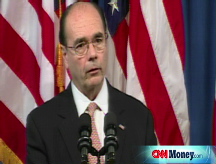What rescue means for mortgage rates
Bailout of mortgage giants should result in lower mortgage costs and make credit more available. But lending standards will stay tight and risky borrowers will still pay extra fees.
| 30 yr fixed | 3.80% |
| 15 yr fixed | 3.20% |
| 5/1 ARM | 3.84% |
| 30 yr refi | 3.82% |
| 15 yr refi | 3.20% |
NEW YORK (CNNMoney.com) -- Mortgage applicants rejoice!
Sunday's federal takeover of Fannie Mae and Freddie Mac will likely translate into lower mortgage rates and greater availability of credit, experts said. Rates could drop by 1 percentage point from the stubbornly-high 6.39% for a 30-year fixed rate mortgage.
"This could be good for would-be homeowners," said Tom LaMalfa, managing director, Wholesale Access, a research and consulting firm. "It would reduce the cost of financing at the new and improved Fannie and Freddie."
The government bailout is aimed at making mortgages easier to obtain and afford. By shoring up the mortgage financing giants, they can continue buying mortgages from lenders and injecting much-needed cash into the system.
"Fannie Mae and Freddie Mac are crucial to turning the corner on housing," said Treasury Henry Paulson. "Therefore, the primary mission of these enterprises now will be to proactively work to increase the availability of mortgage finance. Our economy and our markets will not recover until the bulk of this housing correction is behind us."
But the news isn't all good. With Friday's report that foreclosures and delinquencies are at all-time highs, Fannie and Freddie are expected to maintain - if not ratchet up - tighter lending standards. And the fees they have introduced for borrowers with weaker credit histories won't go away anytime soon.
Mortgage rates borrowers pay are dependent on the yields that investors demand when buying mortgage-backed securities from Fannie and Freddie.
Investors' doubts about the companies' viability have sent interest rates on those securities soaring. Despite regulators' July promise that they would step in to save the mortgage companies, investors are still demanding rates of 2.25% to 2.45% above Treasuries, LaMalfa said. Historically, the spread has been 1.25%.
With the government now taking over the companies and minimizing the risk associated with their debt, investors may be willing to ease off their need for higher rates.
High borrowing costs have led, in part, to a decline in mortgage borrowing. Applications are down 27% from a year ago, according to the Mortgage Bankers Association.
Also Fannie (FNM, Fortune 500) and Freddie (FRE, Fortune 500) will likely reverse their recent pullback from the mortgage markets. In early August, when they reported just over $3 billion in combined second-quarter losses, both said they would scale back their purchases of mortgage securities to preserve their capital.
Borrowers, however, shouldn't expect the ever-tightening lending standards to ease. With defaults and delinquencies multiplying and home prices falling, Fannie and Freddie will likely keep a close eye on underwriting practices. Lenders are demanding credit scores above 700 these days, up from 620 in the past, and downpayments of 20%, up from zero in some cases, experts said.
The mortgage titans have also increased their fees in hopes of shoring up their finances. Just last month, Fannie Mae announced higher surcharges for loans to weaker borrowers. For instance, applicants with credit scores between 640 and 659 who are putting down 15% to 20% will pay an additional 2.25% charge.
The same borrower would pay 1.7 percentage points more because of higher fees and rates for the same loan today as he or she would have paid 18 months ago, LaMalfa said.
If the market continues to worsen, standards could further tighten and fees could rise more, he said.
"We may have more stringent standards over the next few weeks because of the continued deterioration," he said. "We don't know where the bottom is yet. It's a falling knife."
Also, while investors have initially cheered regulators' moves in the past, their confidence has been short-lived. It remains to be seen whether and for how long Sunday's action will placate them, said Kurt Eggert, law professor at the Chapman University School of Law. And if investors' spook again, rates will rise.
"If I were an investor, I'm not sure this would be enough to make me want to jump in with a lot of money," Eggert said. ![]()





